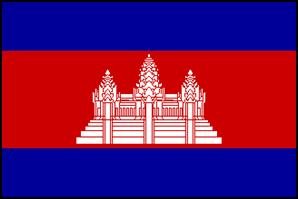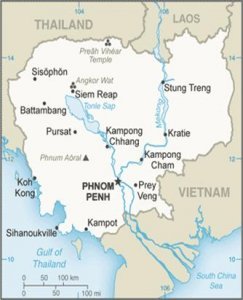CAMBODIA – GENERAL INFORMATION

GEOGRAPHY
Cambodia, also known as Kampuchea, is a country located in Southeast Asia. It is bordered by Vietnam to the East, Laos to the Northeast, The Gulf of Thailand to the Southwest and Thailand to the Northwest. Its most predominant features are the legendary Mekong River which flows south through the country and the Tonlé Sap Lake in the center.
HISTORY
The golden era of the Khmer dynasty, from the 9th to the 15th centuries, made the kingdom of Kambuja (from where modern-day

Cambodia gets its name) one of the most powerful in Asia. After a long period of decline, the country fell under French colonial clutches in the 1800s. Independence was finally achieved in 1953, after which Norodom Sihanouk was appointed the king. His first reign lasted until the 1970s, when a coup d’etat and the Khmer Rouge led to years of repression. Following a period of Vietnamese occupation, Sihanouk returned to the throne in 1993. His son, the current monarch, took over following his father’s abdication in 2004. Politically, Hun Sen and the extreme-left Cambodian People’s Party have been in power since a disputed election in 1998.
THE PEOPLE
After the Khmer the largest ethnic group in Cambodia is the Chinese who dominate the business community. In addition there are a considerable number of Vietnamese. In the highlands and rural areas Hmong and Thai groups also live.
SOCIAL CONVENTIONS
Sensitivity to politically-related subjects in conversation is advisable. Avoid pointing your foot at a person or touching someone on the head, as it’s considered insulting. Women should keep their shoulders covered and should not wear shorts when visiting pagodas.
LANGUAGES
Khmer is the official language and spoken by 95% of the population. Chinese and Vietnamese are also spoken. French was widely spoken and is still taught in schools. English is commonly spoken in Cambodia. It’s estimated that over 50% of the population are conversational in English, but travelers may find it hard to communicate in smaller villages. Learning a few basic Khmer words will get you far, and earn you respects from the locals.
GOVERNMENT
Constitutional monarchy since 1993.
TIME ZONE
Cambodia is 11 hours ahead of Eastern Standard Time (EST).
ELECTRICITY
220 volts AC, 50Hz. Two-pin plugs are in use. You will need a voltage converter, and plug adapter in order to use U.S. appliances. Power cuts are frequent.
CLIMATE
Cambodia has two seasons. One is cool and dry and lasts from November to March with temperatures around 80ºF-95ºF. January is a very pleasant month to visit. The monsoon season, which is humid and hot, lasts from June to October, with temperatures between 95ºF-105ºF. During this season humidity can be as high as 90%.
CLOTHES TO WEAR
Lightweight clothing is worn all year. Rainwear is essential during the monsoon season. Rain may continue solidly for days on end.
LOGISTICAL
Entry & Exit Requirements:
You will need a valid passport and a Cambodian visa to travel to Cambodia. Tourist and business visas are valid for one month beginning with the date of entry into Cambodia. Cambodia offers on-line visa processing. You may also apply in person at the Cambodian Embassy located at 4530 16th Street NW, Washington, DC 20011, tel. 202-726-7742, fax 202-726-8381. Tourists and business travelers may also obtain a Cambodian visa at the airports in Phnom Penh, Siem Reap, and at all major border crossings. Cambodian airports now collect fingerprints upon entry using an inkless, electronic process. You will need two passport-sized (4cm by 6cm) photographs and a passport valid for a minimum of six months beyond the date of entry into Cambodia. Cambodia regularly imposes fines for overstay of an expired visa. If the overstay is 30 days or less, the charge is USD $5.00 per day; for overstays of more than 30 days, the charge is USD $6.00 per day. You should contact the nearest embassy or consulate of Cambodia or visit the Embassy of the Kingdom of Cambodia web site for the most current visa information.
The U.S. Department of State is unaware of any HIV/AIDS entry restrictions for visitors to or foreign residents of Cambodia.
Embassy Locations:
U.S. Embassy in Cambodia
#1, Street 96 (near Wat Phnom), Khan Daun Penh,
Phnom Penh
Tel: (855-23) 728-000
Fax (855-23) 728-700
http://cambodia.usembassy.gov/
Embassy of Canada in Cambodia
# 9/11 R.V. Senei Vinnavuat Oum Sangkat Chaktomouk, Khan Doun Penh Phnom Penh
Tel: (844) 213-470 ext. 426
Fax: (844) 211 389, 231 413
http://www.canadianembassyinformation.com/embassy-in/cambodia.html
HEALTH
Medical facilities and services in Cambodia do not meet international standards. Both Phnom Penh and Siem Reap have a limited number of internationally-run clinics and hospitals that can provide basic medical care and stabilization. Medical care outside these two cities is almost non-existent. Local pharmacies provide a limited supply of prescription and over-the-counter medications, but because the quality of locally obtained medications can vary greatly, make sure to bring a supply of your medications that is adequate for the duration of your stay in Cambodia. You should be wary of purchasing local medication. Counterfeit medication is readily available, often indiscernible from authentic medication, and potentially lethal.
Please note: Some medications may not be permitted in the country. Please check if the medication you are bringing is permitted in the country you are visiting.
Information on vaccinations and other health precautions, such as safe food and water precautions and insect bite protection, may be obtained from the Centers for Disease Control and Prevention’s (CDC) hotline for international travelers at 1-800-CDC-INFO (1-800-232-4636) or via the CDC website at http://wwwnc.cdc.gov/travel. For information about outbreaks of infectious diseases abroad, consult the infectious diseases section of the World Health Organization (WHO) website at http://www.who.int/topics/infectious_ diseases/en/. The WHO website also contains additional health information for travelers, including detailed country-specific health information.
BANKS & CURRENCY
Riel (KHR; symbol CR). Notes are in denominations of CR 100000, 50000, 20000, 10000, 5000, 2000, 1000, 500, 200, 100 and 50.
US Dollars are widely exchangeable and can often be used as payment in their own right. Thai Baht can be easily exchanged close to the Thai border, but other currencies are generally only recognized at banks. Credit cards are now more widely accepted in up-market hotels, shops and restaurants catering to visitors. There are ATM’s in Phnom Penh, Siem Reap and Sihanoukville. It is always best to carry cash (US Dollars if necessary) in small denominations. Travelers’ checks have limited acceptance and are generally not recommended. Travelers’ checks in US Dollars can be changed at banks and some hotels, but can be difficult to change outside major cities. The import and export of local currency is prohibited. Foreign currency may be exported up to the limit declared at customs on arrival.
Banking Hours: Mon-Fri 8am-3pm. Some banks are open on Saturdays 8am-11:30am.
COMMUNICATION
Country code: +855. Prepaid telephone cards are available in post offices, hotels and shops for public phones around Phnom Penh and Siem Reap.
Roaming agreements exist with many international mobile phone companies. Coverage is good in major towns and cities and patchy elsewhere. Internet is available in most areas. Internet cafes are available in Phnom Penh, Siem Reap and all other major towns. Airmail to Europe takes at least a week and longer to the USA. Post office hours: Generally Mon-Fri 07:30/8am-5/17:30pm, sometimes closed for lunch.
Cell Phone Usage:
Please contact your cell phone provider to determine whether your contract includes coverage in the country you are visiting. Depending on your contract you may have to add international services and/or country specific services.
ENTERTAINMENT
Food & Drink:
Khmer food is one of the major national identities that reflect the ways of life, thought, and mind of the Cambodian people which are hidden in the taste of consumption of meat dishes and sweet food. Khmer cuisine shares much with that of both Thailand and China, although it tends to steer clear of excessive use of spices. Quality restaurants are found in all areas that see mainstream tourism, while cheap but tasty food stalls are ubiquitous around the country. Most meals are rice-based.
National specialties:
- Prahok (fermented fish paste) is used to flavour many dishes
- Local fruits include banana, coconut, the durian fruit (known for its distinctive odour), jackfruit, longan fruit, lychee, pineapple and rambutan fruit (which has translucent white flesh)
- Crispy fried spiders are a snack for the adventurous in Northern Cambodia
- Amok trey (fish in a thick coconut curry sauce, wrapped in banana leaves and steamed)
- Rice noodles proliferate and can be bought covered in curry sauce from street vendors.
National drinks:
- Fresh coconut juice
- Green tea
- Rice wine
- The local beer is called Angkor
- The most popular, and refreshing, Khmer drink is soda water with a squeeze of lemon
Nightlife:
It’s not difficult to find vibrant nightlife in Cambodia, particularly in heavily visited destinations such as Phnom Penh and Siem Reap (which neighbors the Angkor Temple Complex). There are plenty bars and restaurants, ranging from down-and-dirty drinking holes to smart cocktail bars. Outright nightclubs are few and far between, although girlie bars are anything but rare. Be sure to check a venue out before handing over a cover charge. Most major hotels offer entertainment of their own, with properties in Siem Reap especially good at hosting traditional dance performances during high season. Gambling is a major pastime in Cambodia and there are several casinos in Sihanoukville and on the border with Thailand.
Shopping:
Visitors to Cambodia have a tendency to leave with bulkier luggage than on arrival: the country’s markets are heavy with potential souvenirs, ranging from silks, textiles and statues to carvings, silverwork and Buddhist artworks. Unique to Cambodia is the omnipresent krama (a unisex checked scarf usually made of cotton), while silk can be bought either by the length, or in the form of scarves and other garments. Jeweler, ceramics, clothing, CDs and DVDs are widespread in city markets (try Phnom Penh Central Market as a starting point) – go prepared to haggle.
Shopping hours: Daily 8am-8pm.
Note: The trade of rare animal furs is illegal, it’s advised to avoid purchasing fur or jewelry made from endangered species.
BAGAGE
Baggage rules for international and domestic air travel have changed much in recent years, differ from carrier to carrier and these days even may cover your on-board bags. Checking luggage may cost a separate fee or may be free depending on your personal status with the carrier. We therefore encourage you to read your ticket’s small print and/or contact your carrier for exact rules.
TIPPING
Gratuities are not included as a part of our service. However, we would like to reiterate that tipping is NOT mandatory and is entirely at your discretion, based on your level of satisfaction for the services that you have received. Having said that, most service providers do expect gratuity. We are pleased to provide you with the suggested guideline, that you may use at your discretion.
LAUNDRY
Laundry services are available in hotels and cruise ships, usually through the floor attendant or housekeeping. One-day dry cleaning and pressing services are offered at better hotels.
PHOTOS & VIDEOS
In some countries you must refrain from photographing sites such as Military bases and industrial installations. Also be aware of cultural sensitivities when taking pictures of or near churches and other religious sites. It is considered polite to seek permission before clicking photos of Cambodian people, especially monks.
USE OF DRONES
The use of drones is being legislated by many countries. In some cases drones are already forbidden and their unauthorized use may carry severe penalties. If you plan to travel with a drone please contact the embassy or consulate of the country you wish to visit.





